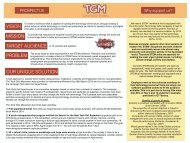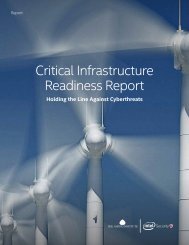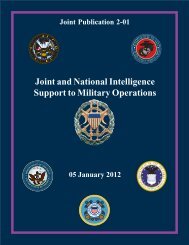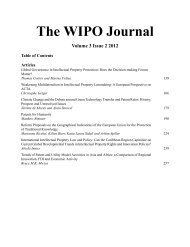Transparency Initiative (EITI)
2eoch1l
2eoch1l
Create successful ePaper yourself
Turn your PDF publications into a flip-book with our unique Google optimized e-Paper software.
49<br />
5.2.4 TRADE AND INVESTMENT CLIMATE<br />
``<br />
There is methodologically robust, however rather outdated<br />
evidence regarding the contribution of the <strong>EITI</strong><br />
to the improvement of the environment for foreign direct<br />
investments (FDI).<br />
COVERING THE STANDARD 2013:<br />
n/a<br />
response to N<strong>EITI</strong> but rather to macro-economic data<br />
like political stability or world market prices for raw<br />
materials. Also for Gabon (p. 17) and Mongolia (p. 22) it<br />
states that there is no clear evidence due to the number and<br />
magnitude of intervening socio-economic and political<br />
factors. According to the study even the quantitative<br />
analysis of global data does not prove any causality<br />
between the initiative and the business environment in the<br />
participating countries (p. 32ff).<br />
BEFORE THE STANDARD 2013:<br />
Schmaljohann (2013) used a panel of 81 countries, aimed<br />
at analyzing the effect of implementing the <strong>EITI</strong> on FDI by<br />
means of regression analyses, including not only the outcome<br />
variable of interest (i.e. FDI in-flows/GDP) but also<br />
a number of independent co-variates for controlling confounding<br />
factors and selection bias (i.e. voluntariness). The<br />
findings from the data analysis show an average increase<br />
of the ratio of FDI inflows to GDP of about two percentage<br />
points, which equals an average absolute increase of about<br />
40%.<br />
Similar positive results can be found in the IADB report<br />
(2013: 23) that states a positive association between <strong>EITI</strong><br />
implementation and the business freedom index of the<br />
World Economic Forum. It concludes that “Since higher<br />
values of this index indicates better investment climate, the<br />
positive relationship between business freedom index and<br />
<strong>EITI</strong> membership suggests that fiscal transparency tends to<br />
improve investment climate.”<br />
The results of the quantitative analysis of Schmaljohann<br />
and the IADB are backed by further findings from qualitative<br />
studies such as Neumann (2014: 6) that declares that according<br />
to informal statements from banking industry experts,<br />
the interest rate for capital is up to 0.5 percentage<br />
points lower for projects that are financed in <strong>EITI</strong> implementing<br />
countries compared to non-<strong>EITI</strong> countries. Furthermore,<br />
it indicates implicit incentives for investments<br />
based on expert assessments (p.7).<br />
In contrast, the Scanteam 2011 report draws a rather<br />
sobering picture. As for the case of Nigeria it concludes that<br />
“The larger business environment appears not sensitive<br />
to N<strong>EITI</strong> activities.” (p. 13). It reasons this finding with<br />
the results of the analysis of indicators of the quality of<br />
business environment that did not show any significant









